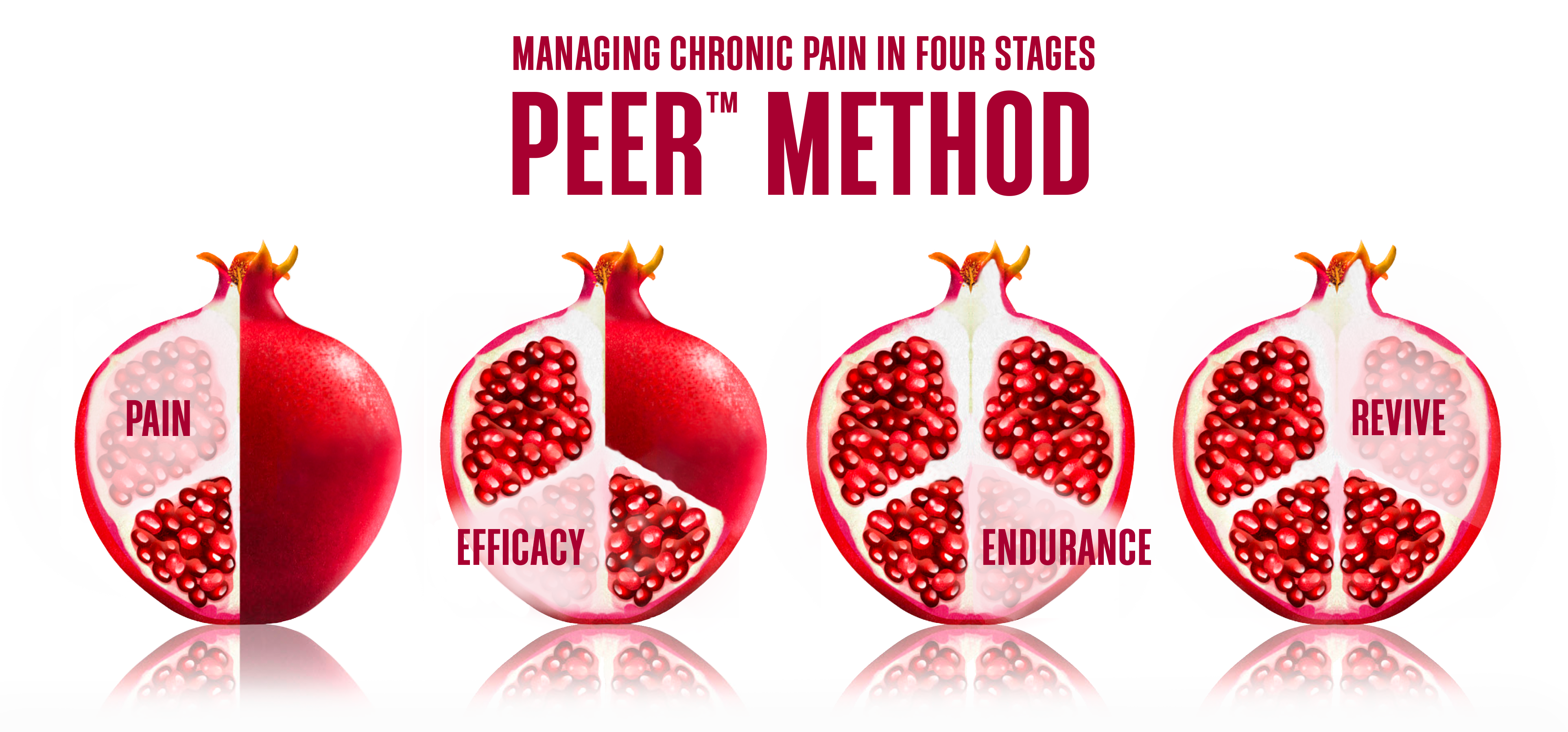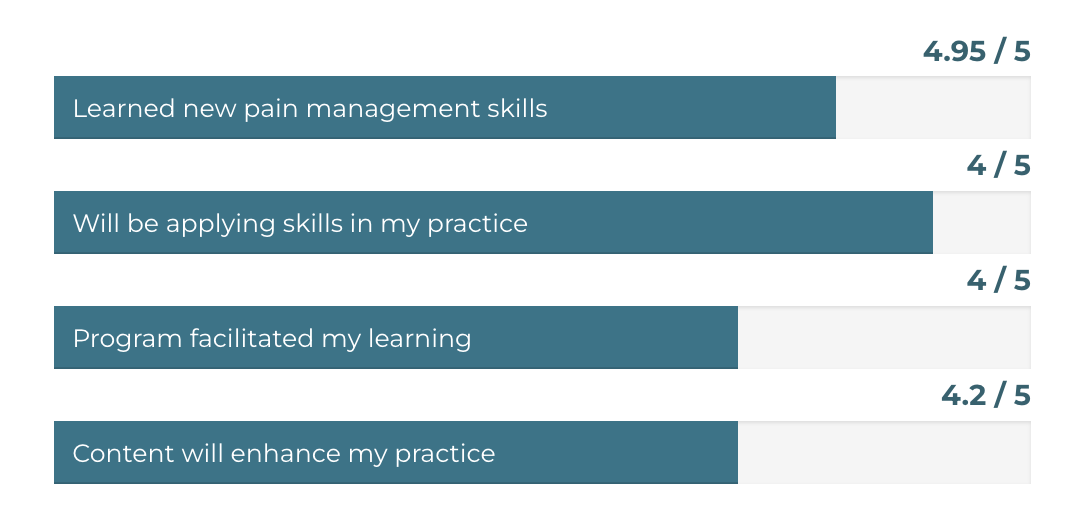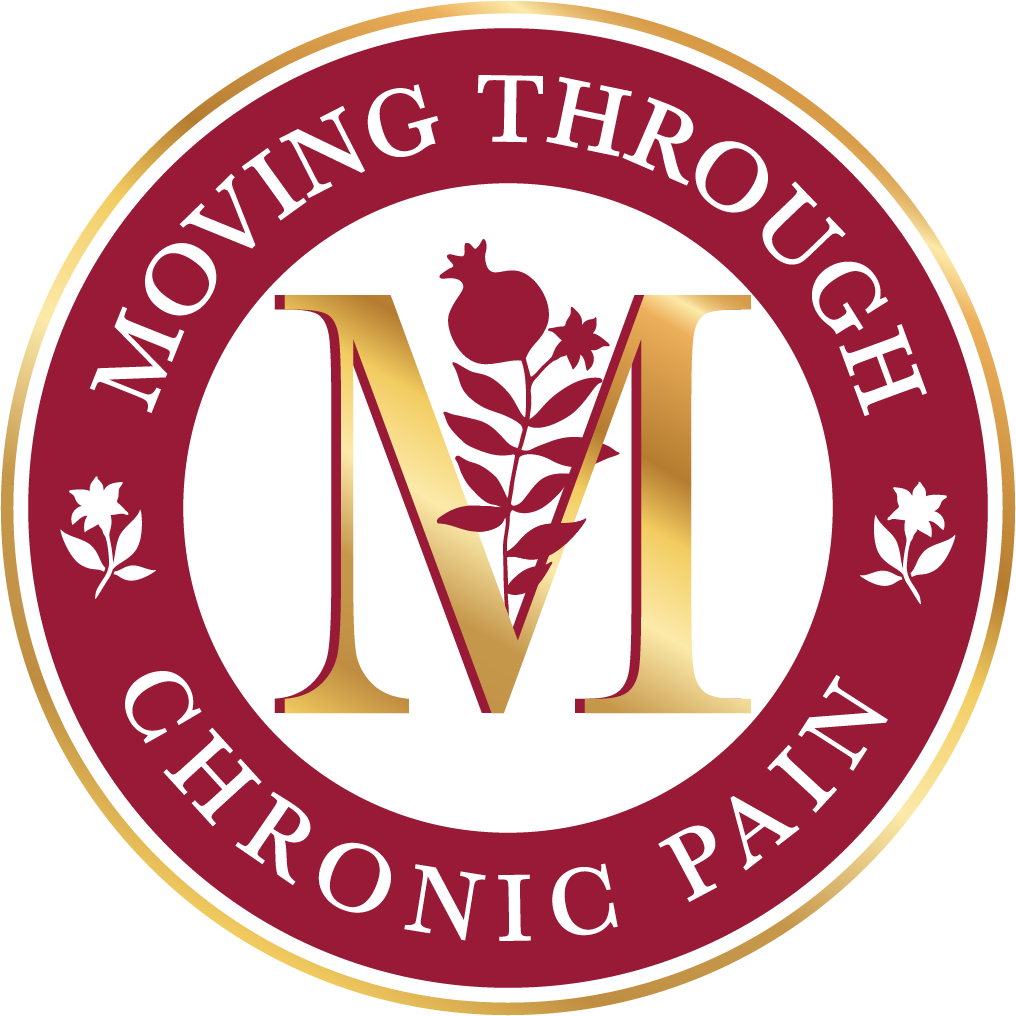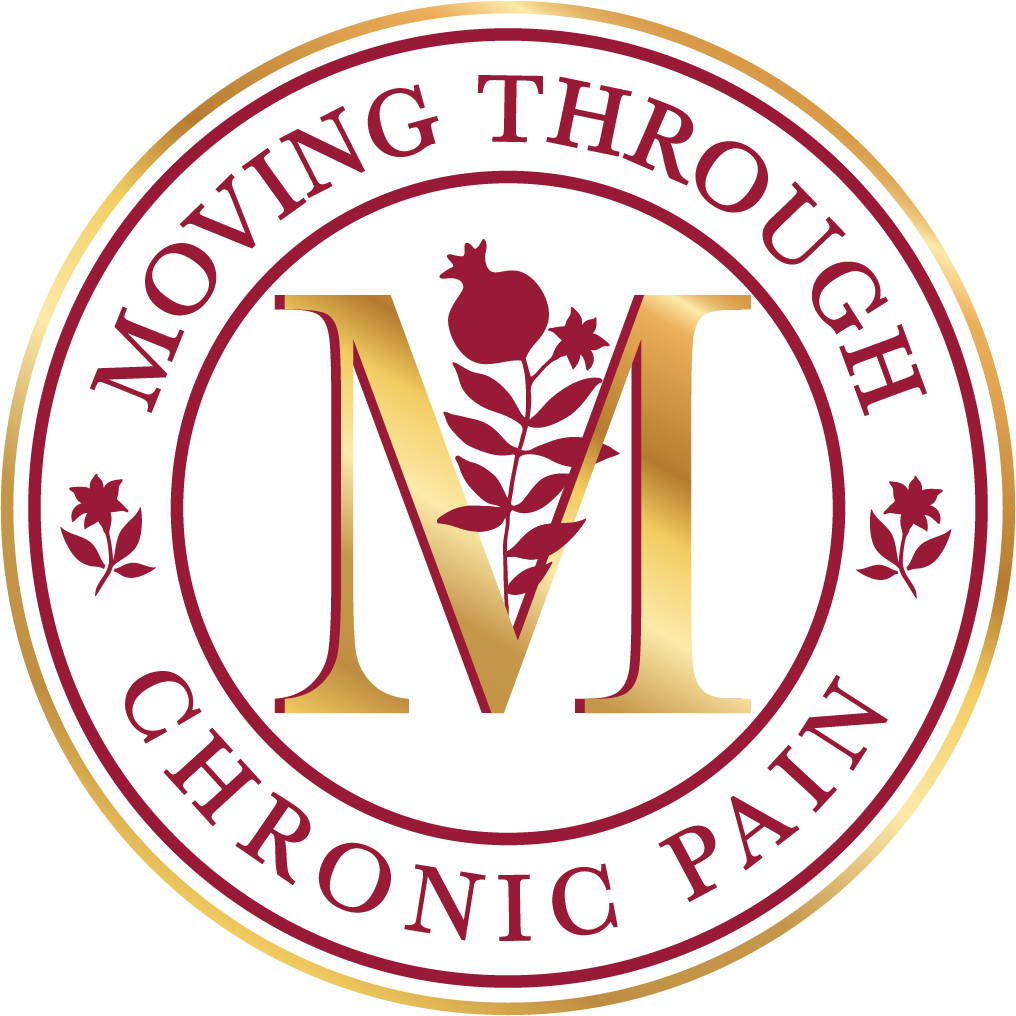THE PEER™ METHOD
PEER™ Method Provider Education
“As a medical professional, I’m accustomed to addressing pain from a clinical standpoint. Collaborating with Moving Through Chronic Pain has given me a profound understanding of the emotional and psychological dimensions of pain. Their resources have enriched my practice.”
DR. EMILY CARTER
Pain Management Physician

HELPING MAKE THE CHRONIC PAIN JOURNEY EASIER
Our PEER™ Method behavioral health solutions offer
successful alternatives in treating chronic pain and addiction.
To date, more than 50,000 Pacific Northwest medical providers have completed our pain management program. 90% of those surveyed feel that the skills they learned were essential to their success in treating patients with chronic pain. Moving Through Chronic Pain offers in-depth, skill-building courses for both patients and providers through our PEER™ Method Programs.
20% of the population (1 in 5 people) suffer from chronic pain. The American Medical Association (AMA) estimates that 3% to 19% of people taking prescription pain medications will become addicted. ALL patients on opioids will become physically dependent after 3 months of use.
*CHART SOURCE: UW Medicine - Extrapolated averages of reduction in Pain Intensity

What providers need to know.
Chronic pain has devastating consequences on function, quality of life, and mental health. People with pain feel their health care providers are not equipped to manage their pain effectively.
52% said their average pain level is 7 or more on a scale of 1-10.
99% said pain has restricted their ability to engage in routine activities
71% said they considered themselves disabled.
60% said they feel anxiety-like symptoms daily or a few times a week.
59% feel depression-like symptoms daily or a few times a week.
79% said they feel stigmatized because of pain.
63% feel stigmatized by their providers.
24% “rarely” or “never” feel validated or listened to.
69% want to feel they are on a “team” with their provider.
53% want providers to help them better understand options for managing their pain.
41% reported their top pain issue, is the need for better pain education for providers.
71% of caregivers said “provider attitudes” are the top barrier to care.
*SOURCE: U.S. Pain Foundation

A “team approach” increases patient satisfaction,
treatment adherence, and successful health outcomes.
Empathy is the basis for improved patient-provider communication.
Having worked closely with thousands of providers and patients over the last ten years. Not surprisingly, when asked, they each report that their experiences, both positive and negative, are identical when navigating the patient–provider relationship in chronic pain. They expressed an overwhelming need for help in successfully navigating patients (and themselves) through pain management. In order to bridge that gap, patients and providers need skills to communicate effectively with one another, listen to each other, share decisions about treatments, and to cultivate an atmosphere of empathy and trust. We believe empathy is a great start.
Encourage patient participation in decisions about their treatment.
When patients disagree with their physicians about the cause of their pain, or the recommended diagnostic and treatment plans, they experience greater dissatisfaction with the care they receive than with patients who agree with their physicians. Physicians may not judge patients' pain levels accurately and are more likely to value diagnostic testing more than their patient’s own report of pain when making clinical decisions. Which is why taking a more inclusive “team approach” with patients when deciding the best course of treatment achieves greater patient satisfaction, treatment adherence, and successful health outcomes.
*SOURCE: Oxford Academic
PROVIDERS
TOP FIVE POWER STRUGGLES OF
73% providers SURVEYED
Struggle with patients for dominance and control
Feel distrust from patients
Perceive patients as deceitful, hostile or “abusive”
View patients as “drug seekers” or “hypochondriacs”
Experience guilt because they feel judged by patients as ineffectual
PATIENTS
TOP FIVE POWER STRUGGLES OF
73% pATIENTs SURVEYED
Struggle with providers for dominance and control
Feel distrust from providers
Perceive providers as deceitful, hostile or “abusive”
Labeled by providers as “drug seekers” or “hypochondriacs”
Experience guilt because they feel judged by providers as difficult patients

PEER™ Method Provider Education Objectives

PAIN
NAVIGATING Difficult Conversations
Equipping providers with communication skills to engage in open, non-judgmental, and empathetic conversations with patients living with chronic pain.
Exploring techniques for discussing opioid tapering, including setting realistic expectations and addressing fears or concerns.
Providing tools for managing resistance and building trust during these conversations.

EFFICACY
THE Hard Truths of Tapering
Applying patient-centered, shared-decision making principles to opioid tapering.
Developing a patient tapering toolkit. Improving the understanding of the patient experience while going through a taper.
Educating patients about opioid withdrawal and the use of safe withdrawal medications.
Understanding and becoming comfortable with BRAVO, a safe and compassionate strategy to approaching opioid tapering, while maintaining a therapeutic alliance.

ENDURANCE
Understanding the Patient’s Perspective
Recognizing the emotional and physical challenges individuals face everyday living with chronic pain.
Exploring the long-term impact of chronic pain on a person’s life, their relationships, their ability to perform daily task, and participate in social activities.
Developing empathy and compassion for patients with chronic pain.

RESTORATION
Preventing Provider Burnout
Educating providers on the risks of burnout when working with patients with chronic pain and engaging in difficult conversations.
Providing strategies to recognize the signs of burnout and stress in themselves.
Teaching self-care techniques and stress management tools to help providers maintain their own well-being.
Promoting the importance of seeking support, both professionally and personally, and addressing the prevention of burnout.
Providers believe their PEER™ Method training was essential in successfully treating patients with chronic pain.
To date, more than 50,000 Pacific Northwest medical providers have completed our pain management program. 90% of those surveyed felt that the skills they learned were essential to their success in treating patients with chronic pain.

*Based on attendees surveyed
ACTIVE PARTNERSHIPS AND AFFILIATIONS


Copyright 2025. All rights reserved.
Annual Public Community Forums
As preemptive programming for the annual Pain Conference, Michelle produced and coordinated community forum events in various venues in Southern Oregon for five consecutive years, drawing renown speakers from across the U.S. More than 400 people attended, all of whom live with chronic pain. Asante, Providence, Jackson Care Connect, AllCare, Primary Health and Oregon Health Authority, along with 50 other organizations sponsored keynote speakers, gift giveaways, health fairs, and dinner.
2014 - Inaugural Forum
Patient Stories: How I Live With Chronic Pain
2015 - Chronic Pain, Opioids and Mental Health
Dr. John Lozier, University of Washington: Chronic Pain and Opioids
Dr. Kevin Vowels, PhD, Clinical Psychologist, University of New Mexico Associate Professor: Mental Health and Chronic Pain
Penney Cowen, founder of American Chronic Pain Association: My Chronic Pain Story
Darryl S. Inaba, Pharmacist: Chronic Pain and Opioids
2016 - Keynote specialists
Sam Quinones, journalist and author, “Dreamland: The True Tale of America's Opiate Epidemic”
Dr. CSaba Mera, Medical Director, Blue Cross Regions: Insurance and Chronic Pain
Dr. Kevin Vowels, PhD, Clinical Psychologist, University of New Mexico Associate Professor: Mental Health and Chronic Pain
2017 - Keynote specialists
Josh Graner, Acupuncture and Pain Rehabilitation: Alternative Therapies for Chronic Pain
Daniel Clauw, Anesthesiology Rheumatology and Psychiatric Specialist, University of Michigan: Chronic Pain Isn’t All In Their Head?
2018 - OPAT Bend Community Forum

Michelle Marikos, Founder & CEO
Moving Through Chronic Pain
Check out our recent topics
LATEST ARTICLES

BLOG CATEGORY
Blog Title Goes Here
Your Paragraph text goes Lorem ipsum dolor sit amet, consectetur adipisicing elit. Autem dolore, alias, numquam enim ab voluptate id quam harum ducimus cupiditate similique quisquam et deserunt, recusandae. here
BLOG CATEGORY
Blog Title Goes Here
Your Paragraph text goes Lorem ipsum dolor sit amet, consectetur adipisicing elit. Autem dolore, alias, numquam enim ab voluptate id quam harum ducimus cupiditate similique quisquam et deserunt, recusandae. here
BLOG CATEGORY
Blog Title Goes Here
Your Paragraph text goes Lorem ipsum dolor sit amet, consectetur adipisicing elit. Autem dolore, alias, numquam enim ab voluptate id quam harum ducimus cupiditate similique quisquam et deserunt, recusandae. here
BLOG CATEGORY
Blog Title Goes Here
Your Paragraph text goes Lorem ipsum dolor sit amet, consectetur adipisicing elit. Autem dolore, alias, numquam enim ab voluptate id quam harum ducimus cupiditate similique quisquam et deserunt, recusandae. here
BLOG CATEGORY
Blog Title Goes Here
Your Paragraph text goes Lorem ipsum dolor sit amet, consectetur adipisicing elit. Autem dolore, alias, numquam enim ab voluptate id quam harum ducimus cupiditate similique quisquam et deserunt, recusandae. here
BLOG CATEGORY
Blog Title Goes Here
Your Paragraph text goes Lorem ipsum dolor sit amet, consectetur adipisicing elit. Autem dolore, alias, numquam enim ab voluptate id quam harum ducimus cupiditate similique quisquam et deserunt, recusandae. here

BOXSTER
Get the Porsche You always Wanted
$450
per month
LIMITED TIME OFFER!
WANT TO KNOW MORE ABOUT US? PLAY OUR PROMOTIONAL VIDEO NOW!
Read our latest news
TESTIMONIAL



Lorem Ipsumis simply dummy text of the printing and typesetting industry. Lorem Ipsum has been the industry's standard dummy text ever since the 1500s, when an unknown printer took a galley of type and scrambled it to make a type specimen book. It has survived not only five centuries.

Jack Walker
Customer


Lorem Ipsumis simply dummy text of the printing and typesetting industry. Lorem Ipsum has been the industry's standard dummy text ever since the 1500s, when an unknown printer took a galley of type and scrambled it to make a type specimen book. It has survived not only five centuries.

Melissa Habit
Customer


Lorem Ipsumis simply dummy text of the printing and typesetting industry. Lorem Ipsum has been the industry's standard dummy text ever since the 1500s, when an unknown printer took a galley of type and scrambled it to make a type specimen book. It has survived not only five centuries.

Adam Hill
Customer
